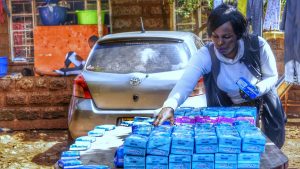Period. The shame. What comes to your mind when you think of menstrual poverty? Do you have an experience with period poverty? Are you a father raising a girl and not so sure what to tell her before or after she starts her period? Is it awkward? Most girls tell me their first knowledge on menstruation happened in school through talks from the teachers and science lessons. Aside from that, they barely had this talk, not even at home.
Guess what; not talking about menstruation creates many problems. For example, go online, read about #MyAlwaysExperience. What comes out shows a huge population of women who think that having rashes after or during their periods is normal. No one has ever told them it’s not, that it’s important to see a gynaecologist in case of such issues. No one has told them about the options they have during their menses. Are we talking enough? Are we having open conversations? Not yet. Women, just because an issue doesn’t affect you doesn’t mean it’s not important to talk about. In fact, one woman/girl facing menstrual shame is just like they say… one too many.

‘Growing up in the ghetto, I found it hard to access sanitary towels. When my mom wasn’t around, I had to find another way for example by getting some old clothes to use. I was afraid of asking my dad for sanitary towels. Later on, I realized that I was not the only one going through such. I however felt that I was better compared to most of my peers. Life in high school was not any different. I would interact with young girls in different fun day occasions and it was sad when one girl approached me and asked if I always get my periods and how I feel about them. She described periods as regrets, shameful and something abnormal because of the bad days she had to endure during that time. This really touched me and that was when Dada for Dada Kenya came to existence,’ narrates Brenda Omondi, a woman who is an advocate of menstrual equality.
‘Dada for Dada officially started on 1st January 2018 with two founders and a group of friends who help us get donations and organise events that take place in Kibera and Kawangware, slums in Nairobi, Kenya. They take place every two months,’ she continues. Knowledge is so important when it comes to girls understanding that menstruation is a natural process. In Anne with an E, a movie, a scene with the young Anne, an orphan depicts the danger of not talking about periods at an early age. Anne discovers a red spot in her clothes. Terrified, she rushes to the sink to wash them. As she cries, she narrates how she is scared of dying.

‘We teach the girls on hygiene when on their periods. We demonstrate how to put on the pads, how to dispose and when and how to change them. We also mentor them on self confidence. Girls are embarrassed when they first start menstruating, so we let them know that it is a natural experience. At the moment, we only deal with girls but we have male friends who accompany us when we go to mentor them. However, we have plans to include boys so that they learn what girls go through in order to support them from an informed perspective. We also involve the parents in the talks. Most of our funding comes from our own pockets and contributions from friends,’ Brenda adds. Dada for Dada Kenya targets Kibra and Kawangware slums and most of the girls are aged 12 and above and are in either primary or high school.

One of the challenges Dada for Dada Kenya experiences is the fact that the topic is still taboo. However, Brenda is very comfortable talking about it and the support from the community keeps her going. ‘Currently, we need more support to mobilize resources to support as many girls as possible. Initially, we wanted to go to schools but lack of resources has limited us to children homes. We also hope that the government can distribute pads to girls in school. I think this will really help in reducing teenage pregnancy. Most of the girls in slums are often lured by men who give them money to buy pads in exchange for sex. Many girls are naive and they do not even ask for protection which leads to many cases of teenage pregnancies,’ says Brenda.

Did you know that in some cultures, women are not allowed to partake in normal activities when they are on their periods? In other cultures, it is believed that if man sees your period, you will be barren. In others, women are seen as unclean and they are told that their prayers won’t be heard by God when they are on their periods. Some women have never seen a pad and they don’t know how it works. They have been raised to believe that the blood should flow naturally the way it is meant to.
For women like Brenda, distributing free sanitary towels offers a solution for many girls. However, what happens when they don’t receive the disposable pads? Your guess is as good as mine. While there are long term solutions such as reusable pads and menstrual cups, not every girl has access to a regular supply of water to make sure that the items are clean. These are some of the issues around period poverty.

Why aren’t we talking about menstruation? Why is it still a taboo?
